


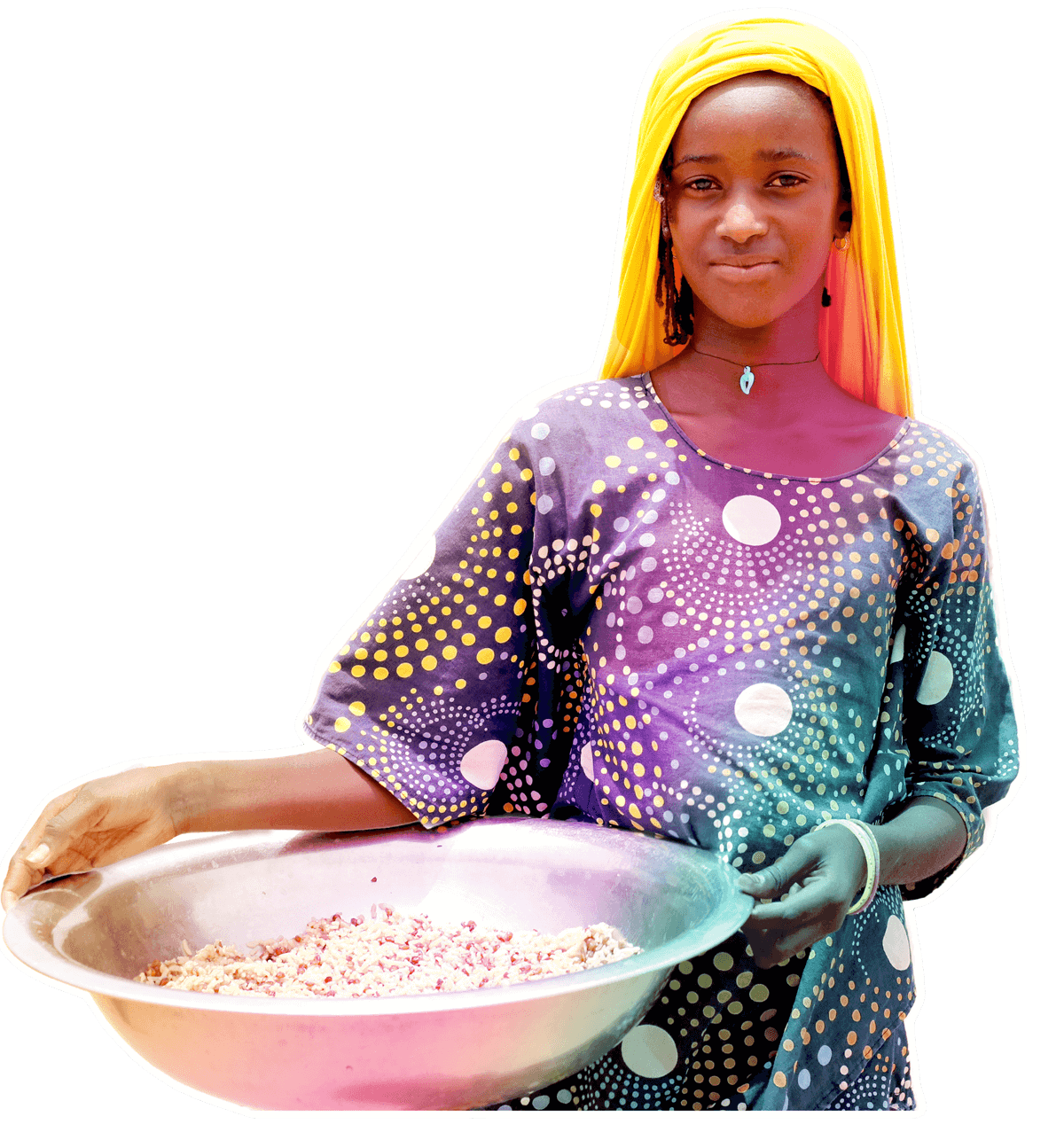


In all our work, Counterpart ensures that diverse women have the skills, resources, sense of self-worth, and decision-making power to make their own choices, exercise their human rights, and influence economic, political, and social change.
Our Work

Dr. Ann Hudock
President and Chief Executive Officer
Letter from the President and CEO
Women’s empowerment is essential for human development. At Counterpart, we are deepening our investment in this area. We see enormous opportunity to affect positive change in the world through the advancement of women. We also see egregious examples of women’s rights trampled, and their voices muted or silenced.
We stand for women’s rights, their inclusion in all aspects of public life, and their rightful positions of leadership. We take this stance alongside the communities where we work with our partners to advance democracy, promote resilience in food systems, and cultivate next generation leaders. Within Counterpart, we have also worked hard to ensure our own team members achieve their full potential. This year we revised our family leave policy to ensure that men and women have paid leave when they add a new family member. Too many people, particularly women, are exiting the workforce when they don’t have these options.
One of the hallmarks of our work is the purposeful inclusion of women; whether we are bolstering civil society in Timor-Leste or feeding students for a better education in Senegal, women are on the front lines of change and they deserve our support. By investing in our women’s empowerment practice area, we are advancing inclusion and women’s empowerment across our global organization.
In 2023, we expanded our professional training offerings through our Global Women In Management program, welcoming dozens of women into its thriving alumni network, and convened Afghan women to share their expertise and formulate strategies for their inclusion back home. In Burundi, women recipients of entrepreneurial training and microloans started their own businesses, left abusive relationships, and are using their voices in both the civic space and at home. In the Dominican Republic, while educating farmers and fishers on sustainable practices and engaging youth in environmental education opportunities, our marine ecosystem management work has also helped close the gender gap. Through scholarships and collaboration with our local partners, women are attending college, serving as mentors to the next generation, and starting promising careers.
These are just a few examples of the stories you will find in this report that exemplify Counterpart’s efforts around the globe—work that is inclusive from its inception, grounded in the trust we establish with our partners, and supported by a diverse staff that is reflective of the people we serve.
Guatemala
Food for Progress (PROCAMPO)
Our USDA-funded Food for Progress project in Guatemala, known locally as “PROCAMPO,” (Productores del Campo Más Prósperos y Organizados) strengthens the ability of rural communities to increase their agricultural production and improve their livelihoods by increasing farming knowledge, providing tools, and building markets for agriculture.
Still recovering from a 30-year civil war that exacerbated poverty, damaged infrastructure, and increased polarization among the country’s 25 ethnic groups, Guatemala has some of the lowest human development indicators in the hemisphere and chronic malnutrition rates of close to 50%. We’ve worked with our partners since 2016 to deliver permanent, scalable solutions.
Women in Guatemala have been impacted the most by food insecurity and poverty. Many men have left rural farmland—or the country—to find work, leaving women to take over agricultural roles. PROCAMPO has helped equip women with skills and market opportunities to support their families and become leaders in their community.
Through our partner Federación Nacional de Cooperativas de Ahorro y Crédito (MICOOPE), the project issued 449 agricultural loans totaling more than $3.1 million to women in 2023. These investments increased production, sales, and incomes of the participants, improving their families’ quality of life. We also trained 1,538 women in agricultural techniques and technologies that increased the quality of their produce and introduced them to markets previously out of reach. And by supporting women producers’ networks, project participants collaborate and sell their products jointly in higher volumes, again, opening new markets for women.
PROCAMPO awarded 71 grants to nearly 400 women to support the production of coffee, vegetables, and small-scale livestock. With this boost, women improved their production quantity and quality, opening access to local, national, and international markets.
In all, the project facilitated over 1,000 agricultural loans totaling almost $10 million in 2023. Because these loans are being paid back, the project has succeeded in reducing risk for other investors, adding sustainability to our efforts.
Since its inception in 2018, 420 agriculture agents have graduated from the Certificate Rural Extension Program and over 500 agricultural organizations have been provided with training and technical assistance on soil conservation, water management, coffee and horticulture production, food security and nutrition. We have also trained over 36,000 coffee producers, resulting in higher yields and better coffee.
$9.66 million
in agricultural loans increased production, quality, and sales
Program success has reduced risk for other investors
Water-efficient irrigation training makes farming more sustainable
This year, I have obtained the second loan I requested from MICOOPE to continue growing potatoes and it has made a big change, improving the quality of life for me and my family.
Zoila Fuentes / ACREDICOM / MICOOPE member
Mauritania
USAID International Food Relief Partnership
Nearly a third of Mauritania’s children have suffered from stunting and 20-30% of children ages six to 19 are underweight. Hunger has severe consequences, pushing death rates of children aged one to four as high as 2.5% and maternal mortality rates well beyond global means. The country’s southern region of Gorgol faces increasing challenges with economic and food insecurity, amplified by recent years of environmental shocks such as drought and flooding. The country’s social services are limited as is the workforce in this vast region with multiple community health needs.
To combat this problem and provide relief to the people of Gorgol, Counterpart, in collaboration with USAID, the Ministry of Health, local communes, and community health workers, embarked on an 18-month International Food Relief Partnership which sourced US-produced shelf stable nutritious foods from Edesia and Breedlove.
The project addressed malnutrition by increasing access to nutritious food and enhancing nutritional knowledge in targeted areas for pregnant and lactating women as well as caregivers of children under the age of five. Counterpart leveraged our existing USDA McGovern-Dole food distribution networks, delivering over 6 tons of Enov’Mum and 5 tons of Harvest Lentil Pro to 3,320 children under five. Through collaboration with community health workers, we reached 86 communities, benefiting 1,930 lactating mothers and 1,905 pregnant women.
The project’s impact extended beyond food distribution. Community health workers, trained in screening techniques, identified individuals at risk for malnutrition or currently malnourished, and referred them to local health clinics. Notably, by the project’s end, no pregnant or lactating women or child under five screened were identified with malnutrition risk.
Counterpart’s team demonstrated strategic focus and resilience in leveraging USDA McGovern-Dole Food for Education program infrastructure for USAID’s critical food distribution. This collaborative effort underscores our commitment to positive change through partnership with Mauritanian communities and marked a significant milestone, showcasing the team’s dedication to addressing nutritional challenges and building resilience in the face of adversity.
3,320 children
under five provided with 11 tons of food rations
3,835 pregnant and lactating mothers
reached with nutrition and health screening
Zero malnourished pregnant or lactating women or children under the age of five at the final screening
The Future is Ours!
and Bridging the Future!
Counterpart’s USDA-funded McGovern-Dole International Food for Education and Child Nutrition programs, The Future is Ours! and Bridging the Future!, are transforming attitudes towards girls’ education and improving the livelihoods of women in our partner communities. While providing daily hot meals to 320 schools in the Brakna, Gorgol, and Tagant regions of Mauritania, the project also implements integrated activities to support the government’s efforts to combat hunger, enhance health, and strengthen the primary education system.
Our school feeding program provided breakfast and hot lunches to 72,730 students in 2023, serving 16,421,596 million meals. This effort significantly bolstered school attendance, retention, and attentiveness, increasing enrollment by 18%. Additionally, to improve the school environment, the program constructed eight latrines and changing rooms, prioritizing menstrual needs. The provision of proper facilities is vital for girls’ well-being and encourages their continued attendance.
To ensure essential nutrition and support during pregnancy and lactation, we provided vulnerable pregnant and lactating women take-home rations. The program distributed over 1,000 tons of Corn Soy Blend Plus to 2,344 pregnant and lactating mothers and to 295 female cooks who prepare the school meals.
In line with empowering local communities, we also launched the “Village Support Girls’ Education” pilot. The program provided trainings to female community members on nutrition, WASH, and the impact of keeping girls in school. We used a demand-driven approach to design livelihood projects with women’s associations based on their own ideas and provided leadership meant to serve their specific initiatives. The projects were designed to improve women’s personal and household economic well-being, which directly affects a family’s ability to prioritize keeping young women in school.
To improve the community’s participation in creating sustainable solutions, the project also trained 60 women leaders from parent teacher associations and our partner communities, supporting their plans and designs to set up income-generating activities. The women started market gardens, poultry farms, and cereal processing operations. With their profits, many are now planning to reinvest in other activities, including selling school supplies.
Counterpart’s efforts to support nutrition and education take a holistic approach that uplifts women and girls, addressing systemic challenges and building sustainable community practices. Through these interventions, we are reshaping the narrative around women’s education and well-being in Mauritania while providing economic and community development opportunities.
16.4 million meals
served to 72,730 students
66,688 students
dewormed twice
295 female cooks
received refresher training in safe and nutritional food preparation
2,344 pregnant and lactating women
supported with rations
8 latrines constructed
with private changing rooms for girls
A school meal can act as an incentive for parents to send their children to school regularly. This is especially important for girls. Proper nutrition can even have long-term health benefits as children grow, reducing the risk of chronic diseases later in life.
Cynthia Kierscht, U.S. Ambassador to Mauritania
Mozambique
Our Bright Future!
In four rural districts across Mozambique’s Maputo Province, the USDA-funded Our Bright Future! project supported transformative initiatives in 2023 through a commitment to improve access to education and nutrition, especially for girls. In just the first two years of implementation, attendance rates at participating schools have increased and numbers continue to grow.
The heart of Our Bright Future! is its women-led school feeding program. The project addressed immediate hunger by providing 9 million nutritious meals to more than 60,000 students, for many of whom this was the only meal they can reliably count on. Often mothers and caregivers, the volunteer school cooks support the children by collecting firewood, securing clean water, harvesting vegetables, cooking nutritious meals, and serving lunch to the students to encourage daily attendance.
The school lunches follow the healthy meal guide laid out by the Mozambiquan government and are made up of a combination of commodities imported from the United States and locally procured maize flour and vegetables. In addition, the project supported 69 new school gardens, trained over 2,000 people in improved agriculture techniques, and trained 491 storeroom managers to manage the food supply.
The project’s impact resonated beyond the school walls through monthly cooking demonstrations. Our team engaged with almost 1,500 pregnant and lactating women and mothers to develop recipes with locally available, nutrient-rich ingredients.
Women received take-home rations, fostering healthier habits and promoting nutritional well-being throughout the community.
In addition to school feeding, the project produced over 40,000 bilingual supplementary reading materials for first and third graders to nurture reading habits in both students’ local languages and Portuguese. The books feature prominent female characters and send a powerful message that there is a place for girls in education. Two years into the project, every primary school supported by Our Bright Future!’s local education monitoring approach has achieved early grade reading and writing proficiency levels that exceed the national average—a testament to the success of bilingual education and the literacy training provided to teachers and school directors.
Mentoring and creating girl clubs was central to the program’s success. With 62 mentors and 74 facilitators, the initiative provided a safe space for 384 students. Topics such as children’s rights, preventing early marriage, menstrual hygiene, nutrition, and environmental protection enriched the curriculum and provided a secure space for dialogue.
The project constructed new latrines in some primary schools featuring dedicated menstrual hygiene areas that afforded girls’ privacy, allowing them to attend school confidently during their periods.
The Our Bright Future! project continues to improve lives, paving the path towards a future where education is inclusive, and women and girls thrive as active participants in their own development.
9 million meals
served across 249 schools
61,668 students
served daily meals
Senegal
Sukaabe Janngo I and II
Counterpart has worked with local partners and the government of Senegal for more than 20 years to improve learning outcomes for children while addressing extreme poverty rates and food insecurity. In 2023, our USDA McGovern-Dole International Food for Education and Child Nutrition Program, named Sukaabe Janngo I (“Children of Tomorrow”) project concluded efforts in the north while ramping up Sukaabe Janngo II in the southern regions of Kolda and Sédhiou in the Casamance.
In 2023, the projects served over 10.5 million meals to 148,234 students across 555 school canteens, improving school attendance and retention rates in line with the Ministry of National Education’s goals of access, equity, and quality in the primary school system. The projects also increased teachers’ skills and provided literacy learning materials.
In the school feeding activity, female cooks played an integral role in cooking and serving meals to students. The projects trained 8,168 cooks in culinary techniques, hygiene, and nutrition. Most of the women apply these skills at home, multiplying the impact in the community. The project also reached over 1,000 pregnant women to improve pregnancy outcomes through knowledge about nutrition and pre-natal care.
With sustainability in mind, the projects assisted 150 community farms and school gardens which are linked to the canteens. As women are key actors in agriculture, we provided them with technical assistance and agricultural inputs, including seeds and equipment. In 2023, they produced 5.4 tons of cereal and legumes and donated over 3 tons to canteens.
Keeping our efforts local, the project procured corn meal that is processed solely by women’s groups. Our first large-scale purchase of 40 tons brought economic benefits to the 30 women directly involved as well as hundreds of local corn farmers. By injecting $43,000 into a very small rural economy, the project has an immediate and huge impact.
Improving reading levels and students’ academic performance is a key part of the project, which is why we held our first summer reading camp and started an after-school tutoring program. Over 3,100 children participated in the summer camps, playing while learning, and enjoying a healthy lunch. Our tutoring activities started late in the academic year, but already students are loving it. With two cohorts, one with solar-powered tablets and one with a traditional tutor, over 1,700 students are participating, including 917 girls.
Over 10.5 million
hot meals served to 148,234 students, including 80,787 girls
25 girls’ clubs
were created to support 625 fifth and sixth grade girls to stay in school
5,440 students
participated in summer reading camps and after-school tutoring
Armenia
Civil Society in Action
Armenian civil society organizations played an important role in grassroots civic movements that led to the peaceful Velvet Revolution that ousted the prime minister and launched a democratic transition in 2018. This change in government presented opportunities for reform and participatory engagement, but few see civil society as key partners.
The Civil Society in Action project aims to change that dynamic by strengthening the sector’s financial viability and enhancing organizational capacity. Counterpart implements this USAID-funded initiative with Urban Foundation for International Development and government partners.
Although Counterpart has supported the people of Armenia in the past, our latest efforts mark a return to the country after many years. President and CEO Dr. Ann Hudock marked the occasion with a special address at the project launch in April 2023.
“It means a lot to Counterpart and me personally to see us return to Armenia to support the great work that has been ongoing by our partners since the time we left when our previous project closed in 2016,” she said. “We know that a vibrant civil society is an absolute foundation to a healthy society and good governance.”
Civil Society in Action, like all our governance programs, recognizes and promotes the active role women must play in civil society and looks to their leadership and involvement to propel development in the country. For example, project grantee Uniting Bridge, an NGO, implements the “Uniting Women for Community Development” initiative to support young women and girls as they participate in community leadership and decision making.
As we continue to strengthen the civic space in Armenia, we will work to ensure that all people, including women and other disadvantaged groups, remain engaged in promoting civic dialogue and are able to fully participate in their country’s young democracy.
20 organizations
supported with over $850,000, half lead by women
56 acts and amendments
drafted by our partner the Center for Legislation
Development Foundation
3 studies
and policy papers completed to promote the financial viability of CSOs
71 government representatives
trained in key governance and management skills
410 community members
mobilized and engaged in community development, more than 70% of them women
Our civil society thrives through the enriching leadership of women. Their unwavering commitment and passion act as catalysts for positive change, inspiring others to contribute
Arpine Hakobyan, NGO Center director
Bangladesh
Promoting Advocacy and Rights
Counterpart’s USAID-funded Promoting Advocacy and Rights project in Bangladesh works to foster accountable governance and empower communities in a narrowing civic space plagued by social upheaval and political sensitivities.
In 2023, the project organized 22 workshops and training events that brought together nearly 500 representatives from civil society organizations to equip participants with the knowledge and skills needed to spearhead citizen-led grassroots advocacy campaigns.
One emerging leader, Jhorna Akter, joined the project to promote urban planning and united 800 individuals across 40 youth groups to transform their neighborhood. Working with the government, her efforts resulted in expanded waste management services and improved access to clean water and safe public spaces. Once discouraged by her family from getting involved, they now praise her accomplishments.
Local grantees under the project also played a pivotal role in mobilizing communities, organizing 67 advocacy campaign events that engaged a total of 2,389 individuals, more than half of whom were women. Through these events, community members caught the attention of policy makers and effectively relayed their concerns to key government stakeholders.
Despite some progress, public life in Bangladesh remains dominated by men. To counter this, the project facilitated the emergence of 19 women leaders in its programs in 2023, giving them the platform to mobilize and advocate for the rights of marginalized groups on a national scale. It also supported over 2,000 women through capacity building and advocacy initiatives and developed gender equality and inclusion action plans for all grantees.
2,389 local actors
mobilized to engage government for change
67 community
organizing events hosted
2,000+ women
trained in advocacy
Once an introvert, now I’m the public face of my community. This has been my incredible journey towards self-confidence. Now, my community people come to me to solve their issues, and I connect them with our local councilor.
Jhorna Akter, youth group member
Burundi
Turi Kumwe
Although Burundi’s deeply divisive civil war ended more than 15 years ago, Burundi still faces challenges establishing long-term peace, security, and economic stability. Youth under 25 are particularly susceptible to getting caught up in conflict and violence due to unemployment and political and ethnic divisions.
Through our USAID-funded Turi Kumwe (“We Are Together”) project that concluded in May 2023, Counterpart worked with local partners to increase Burundian youth engagement in peacebuilding and improve economic opportunities.
Recognizing that traditional gender norms largely exclude young women from fully participating in the economy and local governance, we made sustained efforts to include women in economic empowerment programs and peacebuilding.
Our program to develop livelihoods through training in entrepreneurship, mentoring, and facilitating microcredit supported over 1,700 members through 62 village savings and loans associations.
Young women made up 53% of participants in our economic empowerment activities, many of whom went on to establish their own businesses. In fact, access to startup capital and training helped over 900 vulnerable women become small entrepreneurs.
We also know that single mothers in Burundi suffer from compounded discrimination and exclusion, so we made efforts to include them in the project. An analysis using Counterpart’s “Gender Analysis in Fragile & Conflict-affected Environments” tool identified the need to model women leaders. With this guidance, we selected women peace activists to participate and inspire the younger generation to support women’s leadership in conflict resolution.
Local dialogue, training, and exchange activities, which discussed gender equality, women’s economic empowerment, gender-based violence, positive masculinity, as well as local conflicts and entrepreneurship opportunities, ensured the meaningful participation of women. At the project’s end, 94% of youth participants were employed.
1,700 members
supported through 62 village savings and loan associations
$128,000
in start-up capital provided
900 women
started their own businesses
Now everyone can see that women can do jobs that are thought to be for men.
Sandrine Banyiyezako, loan recipient
Dominican Republic
Coastal Climate Resiliency Program
Counterpart’s work in the Dominican Republic started almost 20 years ago and continues today through the Coastal Climate Resiliency Program, which works to reduce local pressures on coastal marine ecosystems while minimizing cultural and economic disruptions in the face of a changing climate.
Because engaging young people in this work is critical, the project serves as the launchpad for our Dominican Environmental Education Program (DEEP), funded by the Frohring Foundation since 2015. In 2023 we trained teachers and near-peer mentors to deliver the DEEP curriculum and facilitate participatory learning in partner schools while providing scholarships and internships for students to pursue careers in science and environmental conservation. Over 300 students from 11 schools participated, sharing the results of their research and work in their communities.
DEEP also sent teachers and high school students to a climate change STEM summer academy in Hiram, Ohio, hosted by our partner Learning Streams International. The mostly female contingent gained field experience through hands-on lessons and learned how to become community organizers and advocate for more shade trees back home.
Over the years, the Coastal Climate Resiliency Program has also helped strengthen the capacity of local organizations, granting almost $90,000 in 2023 to AgroFrontera, FUNDEMAR, the Punta Cana Foundation Group, and the Center for the Conservation and Eco-Development of Samaná Bay. With our help, these groups implemented training programs for youth and farmers, provided additional internship and scholarship opportunities, improved infrastructure and equipment, facilitated monitoring and restoration activities, and launched ecotourism initiatives.
In collaboration with our partners, we also trained 120 fishers in sustainable fishing practices and climate risk management to protect their livelihoods, mentored 12 young technicians in coastal marine conservation, and provided training on the restoration of coral reefs.
Our work in the country prioritizes the participation of women and young girls and ensures that grant activities are designed and implemented with an approach that reduces gender gaps and promotes women’s rights and participation.
300 students
from 11 schools joined DEEP
120 fishers
trained in good fishing practices
$90,000
in grants awarded
CCRP’s work in the community is significant. You can see how in my case I started as a student and now I proudly hold the position of biologist in the organization that trained me in environmental awareness. This progression underscores the meaningful contributions and transformative power of community-based initiatives in shaping my career.
Yulissa Reyes from FUNDEMAR
Ecuador
New Partnerships in Open Government
New Partnerships in Open Government, a USAID-funded project, works to advance Ecuador’s participation in the Open Government Partnership through broad collaboration with both the public and private sectors, civil society, academia, and international partners. The Open Government Partnership is a global initiative that seeks commitments from governments to enhance transparency, empower citizens, combat corruption, and leverage technology for effective governance.
With Counterpart’s support, Ecuador is implementing its second OGP National Action Plan, which includes 15 commitments identified through a co-creation process facilitated by the project. Last year, we supported local government entities and their civil society counterparts to implement key commitments from the second National Action Plan, including several measures to foster local government innovation, openness, and public participation.
The project strengthened the capacity of 45 representatives from private and public organizations responsible for implementing the action plan commitments, delivering a monitoring and evaluation training workshop to share tools and best practices for open government.
In addition, the project supported the creation of the Gender Committee at OGP Core Group in 2023. We delivered training on gender mainstreaming for the 15 national action plan commitments and trained 35 public and private representatives who are integrating inclusive democracy practices into commitment implementation.
We found that women in Ecuador face challenges accessing and using technology, including recent artificial intelligence products, as proposed in the country’s Open State Initiative. To address this widening gender and technological gap, our local partner, Fundación Datalat, developed a program to increase women’s ability to adopt emerging technologies responsibly and securely. There, participants learned about a wide variety of digital identity tools and image and logo generators, and strengthened their ability to use artificial intelligence to improve services and enhance open government. The project focused on the protection of personal data and used high profile legal cases to help build understanding of the limits when collecting personal data.
Counterpart’s collaboration among government entities, civil society organizations, academia, and international development agencies played a crucial role in these achievements. This collaborative effort reflects the commitment to fostering openness, inclusivity, and transparency in Ecuador’s governance processes.
352 public officials
trained in open government, transparency and anticorruption through Fundación Ciudadanía y Desarrollo’s online training program
80 private sector representatives
trained in democratic corporate responsibility with the support of the International Seniors Lawyer Program
100 indigenous communities’ representatives
trained in open government practices through our support to the Indigenous Parliament and local civil society organizations
524 local government officials
trained in security and open government plans through our support to the Local Development Network GESODEL
174 judges, prosecutors, and public officials
trained open justice and gender mainstreaming through our support to the Ecuador’s Justice Observatory
El Salvador
Rights and Dignity Project
In response to the critical human rights challenges in El Salvador, Counterpart’s Rights and Dignity Project is dedicated to fostering a more tolerant, just, and equitable society. By collaborating with governmental and non-governmental entities, the project aims to enhance human rights protection systems and promote inclusive development.
Recognizing the interconnectedness of human rights and sustainable development, the project prioritizes interventions in security and anti-discrimination efforts. As part of its gender and social inclusion strategy, the project conducted training sessions to integrate approaches such as ‘Do No Harm’ and victimology, engaging 34 participants to address gender disparities and promote inclusivity.
The project provided specialized support to key governmental partners, enhancing the capacity of 325 officials, the majority women, to provide rights-based protection, particularly for vulnerable populations. This support enables officials to better address the specific needs of victims, including women, thus improving access to justice.
Empowering human rights defenders is another focus, with 594 individuals—predominantly women— trained and supported to advocate for the rights of marginalized groups. Notably, the project facilitated workshops on documenting human rights violations, empowering defenders to effect change within their communities.
In fact, with our support, over 125 instances of serious human rights violations were documented and presented to state institutions or international organizations.
Addressing the security concerns faced by activists and journalists, the project also conducted workshops on personal security and first aid, which integrated a gender-based approach to mitigate risks effectively.
Through awareness-raising campaigns and educational initiatives, the project reached diverse audiences, including youth, women, and vulnerable communities, supporting their efforts. Over 5,800 users interacted with the National Observatory of Human Rights, a nationally and internationally recognized database of human rights violations in El Salvador with expert analysis on human rights issues.
We trained 2,191 teachers on these issues, and hundreds of university students participated in events to raise awareness about gender-based violence. These are but a few examples of how the project fosters a culture of respect for human rights and promotes policy change.
Through research studies and advocacy efforts, the project continues to raise awareness of human rights violations and advocate for vulnerable populations, contributing to a more inclusive and equitable society in El Salvador.
847 cases
of alleged police abuse reported
3 research studies
completed to support evidence-based policy recommendations
36 municipalities
reached by awareness campaigns to support vulnerable groups
The atmosphere generated by official hostility against journalists, causes my family circle to question my professional decisions, as well as choosing the media for which I work, and even the decision whether to continue living in El Salvador.
Journalist who participated in the research “The Air We Breathe.” Name withheld for security reasons.
Working to Strengthen Diversity
In response to the urgent need to enhance the rights and representation of the LGBTQI+ community in El Salvador, Counterpart is working to empower historically underrepresented voices and foster collective advocacy to promote and protect the rights of LGBTQI+ people. Amid an environment marked by cultural conservatism and violence, particularly against LGBTQI+ individuals, the project endeavors to create a more inclusive and supportive society.
Recognizing the underrepresentation of certain groups within the LGBTQI+ movement, including lesbians, queer women, and transgender men, Counterpart focuses on strengthening their capacities and amplifying their voices. Through workshops and sub-grants, we engaged with grassroots organizations to implement advocacy activities, reaching 106 individuals in 2023, equipping them with skills to advocate for their rights creatively and effectively.
In collaboration with local organizations such as Daughters of Sappho and Nayarit Women and Youth, we also facilitated commemorative events and workshops to address gender-based violence and support lesbian and queer women.
These initiatives provided a platform for dialogue, healing, and empowerment, shedding light on the challenges faced by LGBTQI+ individuals in El Salvador.
Counterpart’s support has also led to significant advancements for sustainability within the Salvadoran LGBTI Federation, with a notable increase in membership and improvements in organizational management and leadership.
In 2023, Counterpart made substantial strides in capacity strengthening through training and supporting over 2,000 human rights defenders across various age groups and regions of El Salvador. We also facilitated the participation of over 500 individuals from rural areas in the 2023 Pride March, fostering greater visibility and solidarity within the LGBTQI+ community.
By uplifting historically underrepresented voices, advocating for LGBTQI+ rights, and fostering community engagement, Counterpart and its local partners are instrumental increating a more inclusive environment in El Salvador.
2,041 human rights defenders
trained and supported
6 new organizations
joined the Salvadoran LGBTI Federation
500 participants
from rural areas attended the 2023 Pride March
Haiti
Civil Society Strengthening Program
In Haiti, Counterpart is a sub-partner to Papyrus, a majority women-owned Haitian management firm, on the USAID-funded Civil Society Strengthening Program. Aligned with the overarching program objective of fortifying Haitian civil society, Counterpart focuses on providing technical support in advocacy, communications and media, and networking.
Counterpart engaged with eight Haitian organizations in 2023, setting the stage for the realization of their advocacy goals. Their focus encompassed the defense of women’s rights, promotion of existing policies that address gender-based violence, handling of pervasive impunity in gender-based violence cases, and mitigation of climate change effects. This initial phase involved a comprehensive assessment of the organizations’ advocacy capacities, then formulating targeted capacity strengthening plans.
Executing the plans in coming years will increase the effectiveness of the organizations’ advocacy and implementation of their strategic initiatives for enduring impact. Simultaneously, Counterpart conducted an introductory advocacy training of trainers for the program team.
The training equipped consortium partners with the materials needed to extend advocacy training to other organizations, expanding the program’s reach beyond the initial eight organizations.
Recognizing the importance of collaborative networks, Counterpart conducted a social network analysis of the Haitian civil society. This initiative aimed to discern existing relationships among civil society organizations and identify opportunities to enhance collaboration.
Through an experiential approach incorporating mentoring and coaching, Counterpart also aims to prepare the organizations to enhance their effectiveness and collectively advance their advocacy objectives.
As Counterpart continues to invest in capacity strengthening and mentoring, the Civil Society Strengthening Program in Haiti will continue to foster a vibrant and empowered civil society where advocacy becomes a catalyst for positive societal change. This work is more critical considering Haiti’s challenging socioeconomic, political, and security context.
Mauritania
Nafoore
Our USAID-funded Nafoore project is a violent extremism prevention program rooted in positive youth development. Led by Mercy Corps and implemented with consortium partner Ecodev, the project collaborates with local civil society organizations to increase the capacity of Mauritanian youth to resist radicalization and recruitment by violent extremist organizations, which take advantage of weak governance, fragile social climates, and disaffected youth.
In 2023, the program established its first youth hub, where a cohort of young men and women participate in a series of training sessions over four months. These hubs are safe spaces that enable the free expression of ideas among participants while developing life skills such as leadership and conflict resolution.
The program is on track to set up a total of eight hubs in different regions of Mauritania to train several hundred young people and support a network of 24 youth-oriented civil society organizations.
Nafoore expanded its scope to address food insecurity and other critical shocks associated with the impact of the Russia-Ukraine war on markets and supply chains. We hosted 12 community meals that served 979 participants in 2023. These meals promoted the values of solidarity, community, and social cohesion while helping to ease burdens on households and provide an opportunity to save resources in the context of global inflation.
We also organized the distribution of food kits, comprised of rice, sugar, pasta, and cooking oil, to 500 vulnerable households, benefiting almost 4,000 people during the lean season in Nouakchott, Trarza, Hodh el Chargui, and Hodh el Gharbi.
Despite a solid institutional framework and the will to advance gender equality, patriarchal oppression combined with the country’s socio-economic constraints hold women and girls back in Mauritanian society. Our work encourages civic participation among women and girls, and our community meals and food distribution activities targeted mostly women and women-headed households.
979 people served
through 12 community meals
500 food kits
distributed to benefit 3,741 individuals
Niger
Development in Niger faces multiple challenges: harsh environmental conditions, violent extremism, internal conflicts, impoverished communities, gender inequality, and poor governance. Our projects in this country aim to secure peace, strengthen civil society, and support the commitment of its citizens to democratic governance.
Jagoranci
In the third year of the USAID-funded Resilient Governance in Niger project, or “Jagoranci,” Counterpart continued to strengthen the social contract between the state and its citizens while bolstering individual, household, and community resilience across 26 communes in the Dosso, Maradi, Tillabéri, and Zinder regions.
Following efforts to secure ownership of key interventions by local and national stakeholders in the first years, the project continued training locally and regionally elected officials on their rights and responsibilities, while strengthening open and participatory processes to evaluate, monitor, and enhance their performance. We improved communes’ capacity to plan their development, budget, communicate, engage citizens, and mobilize resources, while sensitizing citizens and local civic actors on their rights, ability to exercise these rights, and agency.
In 2023, more than 100,000 people were educated on rights and governance through awareness campaigns. We also supported communes with developing their Visible Improvement Services plan and designing participatory budgets. The project’s Complex Crises Fund also supported the fair and transparent distribution of 310 tons of food to 31,000 vulnerable households.
After a pivotal gender analysis uncovered persistent inequalities in decision making, access to information, and public services by women, the project made efforts to ensure women know their rights, have greater agency to engage in communal governance, and actively exercise these rights.
We trained 120 women—including youth and people with disabilities—in gender equality, leadership, and advocacy techniques to support their effective participation in intergenerational dialogues, local governance, and handling debate in the home. The women learned how to create information groups and peer networks and obtain legal recognition at the municipal level.
Another barrier to citizen participation is the nearly 69% illiteracy rate of those 15 and older in the country. To address this challenge, Jagoranci established 15 functional literacy centers and trained 175 illiterate local governance actors (including elected officials and civil society leaders) in basic reading, writing, and arithmetic skills. Lessons included roles and responsibilities of elected officials and civil society actors, decentralization, leadership, and human rights concepts. The program was so successful that six new centers are planned for 2024 with 120 new learners already identified.
26 communes
served
175 leaders
trained in functional literacy
100,000+ people
sensitized on rights and governance through awareness campaigns
38 listening clubs
Created and/or revitalized to raise awareness of citizen’s rights and duties
31,000
vulnerable households received 310 tons of food
With learning functional literacy, I have become a true female champion in my community.
Zina Souleymane, Guidimouni leader
Kagalo
Counterpart’s Kagalo: Empowered Women for Change project is designed to strengthen the fragile state of democracy in Niger and Burkina Faso by enhancing women’s roles in the democratic process.
Concluding in March 2023, Kagalo focused on improving women’s readiness for and participation as leaders in the democratic development of Niger and Burkina Faso and increasing women’s participation in decision making processes at the local and national levels.
Collaborating with our Nigerien partner Femmes Actions et Développement, Kagalo focused on building the capacities of women leaders, positioning them to have roles in local affairs, decision making, leadership selection, public affairs management, and citizen accountability.
Women have been historically excluded from taking communal leadership positions in Niger, but that didn’t stop Aïssatou Adamou from pursuing her aspirations of becoming a leader in her community. She participated in our training focused on leadership, management, and public speaking, which was funded by the U.S. State Department’s Bureau of Democracy, Human Rights, and Labor.
Later elected as a municipal councilor, Adamou now holds several leadership positions, including department president of the Elected Women of the Tillabéri Region and president of the Cultural-Social Affairs Commission for the Promotion of Women and Protection of Children. She also participated in the project’s implementation of the second national action plan’s Women, Peace, and Security effort, fostered peace between local women and displaced persons, and is in contact with Niger law enforcement, directly communicating her community’s concerns and priorities. Adamou is just one example of how the project has elevated the role of women in local governance.
As budgets reflect priorities, we systematically conducted interviews on gender-responsive budgeting with Kagalo participants and elected officials. After validating the findings with local Nigerien civil society organizations, Femmes Actions et Développement and the team drafted recommendations to ensure women’s involvement in budgeting decisions as well as plans to monitor progress. Three communal councils adopted the frameworks that resulted from this process. Participants noted significant improvements in women’s participation in local council meetings at the communal and regional levels, as well as an increase in consideration of women’s priorities and gender-responsive budgeting.
1,926 private and public sector leaders
trained to advance gender equality and female empowerment through their institutions and organizations
630 individuals
received civic education
260 local leaders
demonstrated their commitment, capacity, and accountability in protecting the rights of women and girls
50 candidates
publicly pledged to adopt women-identified priorities
When I was elected councilor, I knew nothing about my role and responsibilities. Now, with the training we received, I am a seasoned professional. I know I must defend the cause of women and must be accountable to my community.
Zeinabou Soumana, Ouallam Commune Councilor
Timor-Leste
NGO Advocacy for Good Governance
After gaining independence just over 20 years ago, Timor-Leste is one of the world’s newest countries and is striving to build its democracy. Counterpart’s USAID/Timor-Leste NGO Advocacy for Good Governance Activity supports these efforts by empowering local organizations to secure their role as critical actors in democratic governance.
In 2023, the activity’s nine NGO partners continued to grow as we helped cultivate their capacity as advocates for their constituents through evidence-based advocacy. Partners underwent a robust regimen of training and workshops, encompassing secondary research and analysis, leadership at all levels, unconscious bias, and theory of change mentorship.
These shared learning opportunities enhanced our partners’ technical capabilities, bolstered their internal governance and management, and instilled confidence, making them valuable collaborators for lawmakers and attractive partners for donors.
Including women in the interventions is critical to the project’s success. Norberta Soares, for example, leads the Community-Based Rehabilitation Network Timor-Leste (CBRN-TL), one of the activity’s nine NGO partners. CBRN-TL focuses on creating an inclusive society, especially for women and children with disabilities.
Applying the skills obtained through the activity’s training program, in 2023 the organization conducted primary research on the accessibility of people with disabilities to health facilities and presented findings and recommendations to the Ministry of Health, establishing a trusted relationship and a formal agreement for further collaboration. The group also established 24 self-help groups in various municipalities to support its members and serve as hubs for continued activism.
Inclusive fellowship programs, which select NGO partners developed with the activity’s support, provide on-the-job training to improve the skills, experience, and knowledge of women, youth, and individuals from marginalized groups. The programs engaged 24 fellows, 13 of whom were women, in 2023. This on-the-job training enhances technical skills in monitoring and evaluation, research, and advocacy and has resulted in fellows securing permanent positions within host organizations, showcasing benefits to both the NGO partners and fellows.
Our commitment to promoting gender equality and social inclusion (GESI) is also evident in the project’s continuous collaboration with NGO partners’ GESI focal points and human resource managers. Monthly monitoring visits and ongoing mentoring underscore Counterpart’s dedication to building capacities for GESI integration within the organizations, ensuring inclusive human resource practices. By addressing unconscious biases and stereotypes through tailored training, the project is facilitating a more inclusive environment.
Our efforts are transforming partner NGOs into dynamic advocates, creating a ripple effect of positive change within communities, and positioning them as key players in democratic governance.
602 citizens
actively engaged in advocacy issue identification and design
24 engagements
between NGO partners and policymakers at the national level
24 fellows
engaged in on-the-job training with NGO partners
The training equipped us with practical approaches to mainstream gender equality and social inclusion in our programs and initiatives. It reinforced our organization's commitment to championing these principles and ensured that our work truly benefits all members of our society.
Lourenco Tito Ximenes Lopes, The Timor-Leste NGO Forum (FONGTIL) Program Manager
Women’s Empowerment
Global Women In Management
Counterpart’s women’s empowerment focus area made significant strides in our effort to fuel greater representation of women in leadership positions across different sectors in countries around the world.
Fostering both personal and professional growth among participants, our programs and training sessions covered a spectrum of topics, including entrepreneurship, leadership, and essential skills for success.
Our Global Women In Management project, sponsored by ExxonMobil Foundation, is a comprehensive investment in women’s personal and professional growth.
In 2023 we convened 17 accomplished women leaders from 14 countries for a two-week program in Washington, DC focused on gender and social inclusion, personal leadership, project design, financial management, and sustainability.
Women delegates met with business leaders, academics, and civil society actors, including members from the Congressional Black Caucus.
Tangible outcomes also emerged as participants in our empowerment training offerings reported a heightened understanding of critical business processes and the ability to apply innovative business ideas using the business canvas model.
Our training sessions equipped women with valuable skills and instilled confidence, enabling them to navigate challenges and contribute meaningfully to their communities and organizations.
We also continued to serve Ukrainian women refugees in Romania, providing support through our self-care and skill-building program. This initiative imparts skills, enhances mental health, fosters resilience, and prepares participants for the job market. We trained nearly 40 women in self-care and mental health counseling skills in 2023, with additional counseling provided to nearly 100 refugee women. We also hosted two job fairs to connect women with employment opportunities.
All participants in our programs join a growing network of alumni who make themselves available for continued personal development and commit to help others through mentorship and peer support.
40 refugees trained
in self-care and skill-building
100 refugees
provided with mental health counseling
17 women
received training in management and leadership, economic advancement, coaching, or gender and social inclusion
10 women
participated in our mentorship program
60+ alumni
participated in regional networking events
The confidence I attained [from GWIM] helped me to know that I can speak in public as a strong leader to help my team and my co-workers.
Nahid Yousry, Philanthropic Leader, Egypt
Unifying Voices Against Gender Apartheid
In the past two years the Taliban have issued dozens of edicts discriminating against women. As their rights are eroded and women are increasingly invisible in Afghan society, a group of Afghan women activists convened in Washington, DC to address this issue. Counterpart is an active participant in their discussions, which focused on several issues, including gender apartheid.
Under international law, apartheid is defined as a system of legalized racial segregation originating from South Africa, but there is a growing consensus among international experts, stakeholders, and activists that the concept can also be applied to gender in countries such as Afghanistan, where women are systemically discriminated against.
Counterpart, in partnership with other organizations, convened Afghan women leaders and women’s rights advocates to explore the inclusion of gender apartheid within international legal frameworks.
Under the rubric Unifying our Voices, this ongoing series of gatherings aims to help Afghan women leaders and activists collectively advocate for the rights of women in Afghanistan. Participants from the United States, Canada, Europe, and Afghanistan joined in the discussions.
In March 2023, when the group first met, Dr. Habiba Sarabi, former Afghan peace negotiator and women’s rights activist, Jamille Bigio, senior coordinator for Gender Equality and Women’s Empowerment for USAID, and Rina Amiri, U.S. Special Envoy for Afghan Women, Girls and Human Rights delivered remarks. Counterpart continues to stand in solidarity with the Afghan women activists who are fighting tirelessly to recover the rights of women and girls in the country.
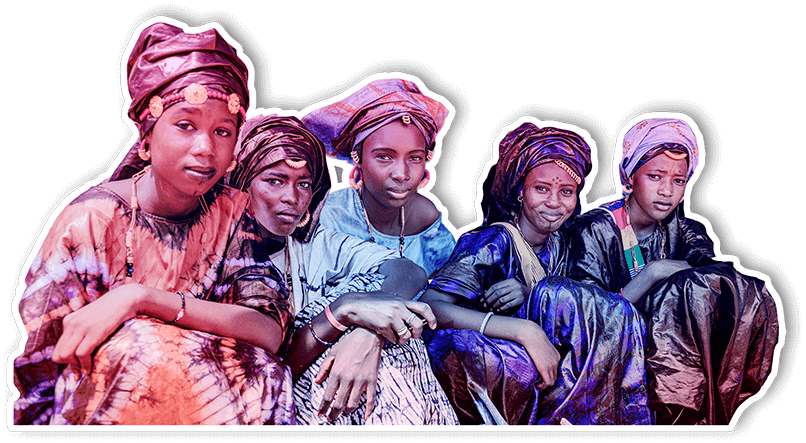
Letter from the Board Chair
In a world shaped by war, famine, and diminishing democracy, it’s important for people to find hope for their future and support in their struggle. That’s why serving on the Counterpart International board of directors is such an honor. I know the work we do makes a lasting difference in the lives we touch around the globe.
Counterpart’s approach to facilitating meaningful change through our programs is rooted in trusted partnerships, robust collaboration, and an unyielding dedication to inclusion. In 2023 I witnessed firsthand the impact of our efforts as the organization continued to grow to meet the needs of an ever-changing world.
As this report shows, we served over 36 million meals to hungry children last year, supported over a thousand pregnant women with home visits, and facilitated improved health and hygiene through WASH protocols and distribution of critical deworming medication. We trained over 5,000 female cooks to support robust food systems, provided scholarships to students to pursue environmental education, and helped women find their voice in burgeoning civil societies.
Our dedication to centering women and other marginalized groups in our work proves to be successful year after year. In fact, we’ve hired both a vice president and director for our women’s empowerment practice area to guide our work moving forward.
I want to extend my gratitude to the Counterpart staff and welcome those who joined our team this year. None of this work would be possible without their impressive commitment to changing the world through an incredible skillset and open heart. Congratulations on a job well done.
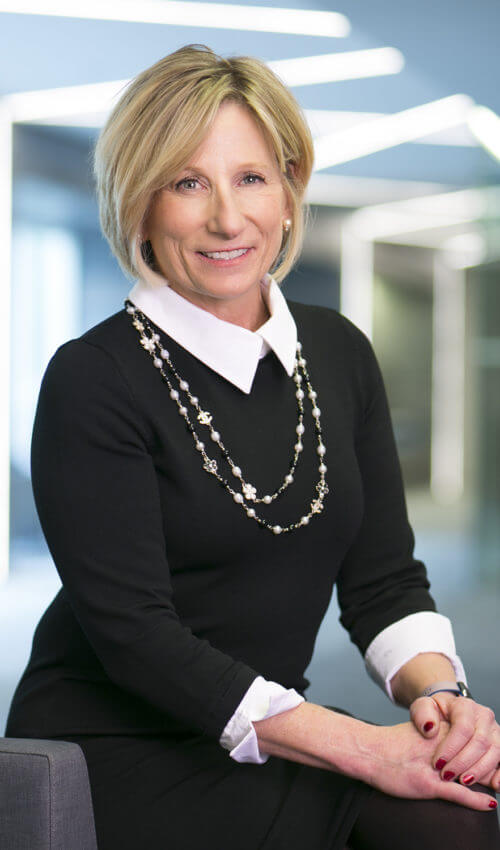
Mary Karen Wills
Board Chair
Our Financials
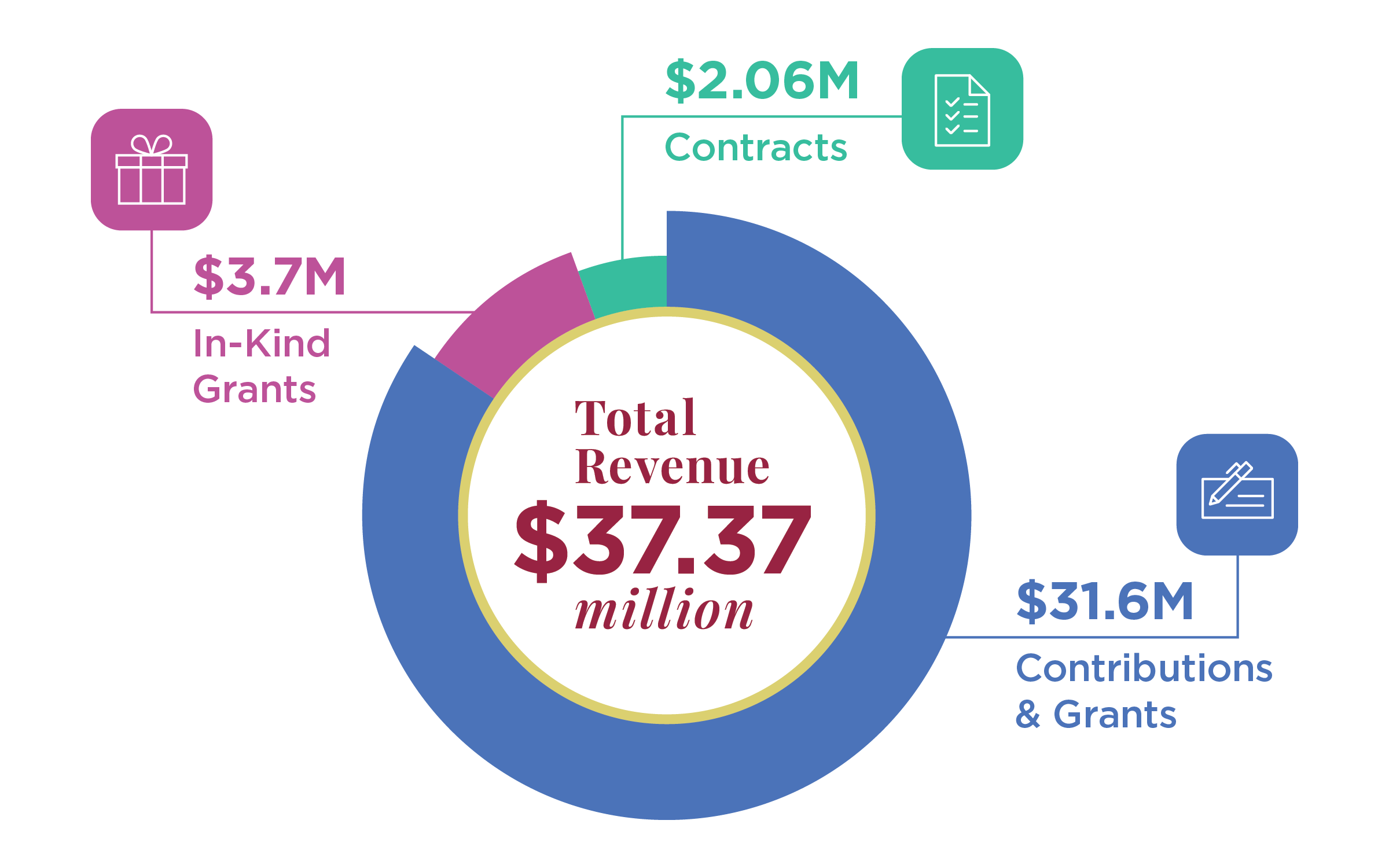
Total Revenue Sources
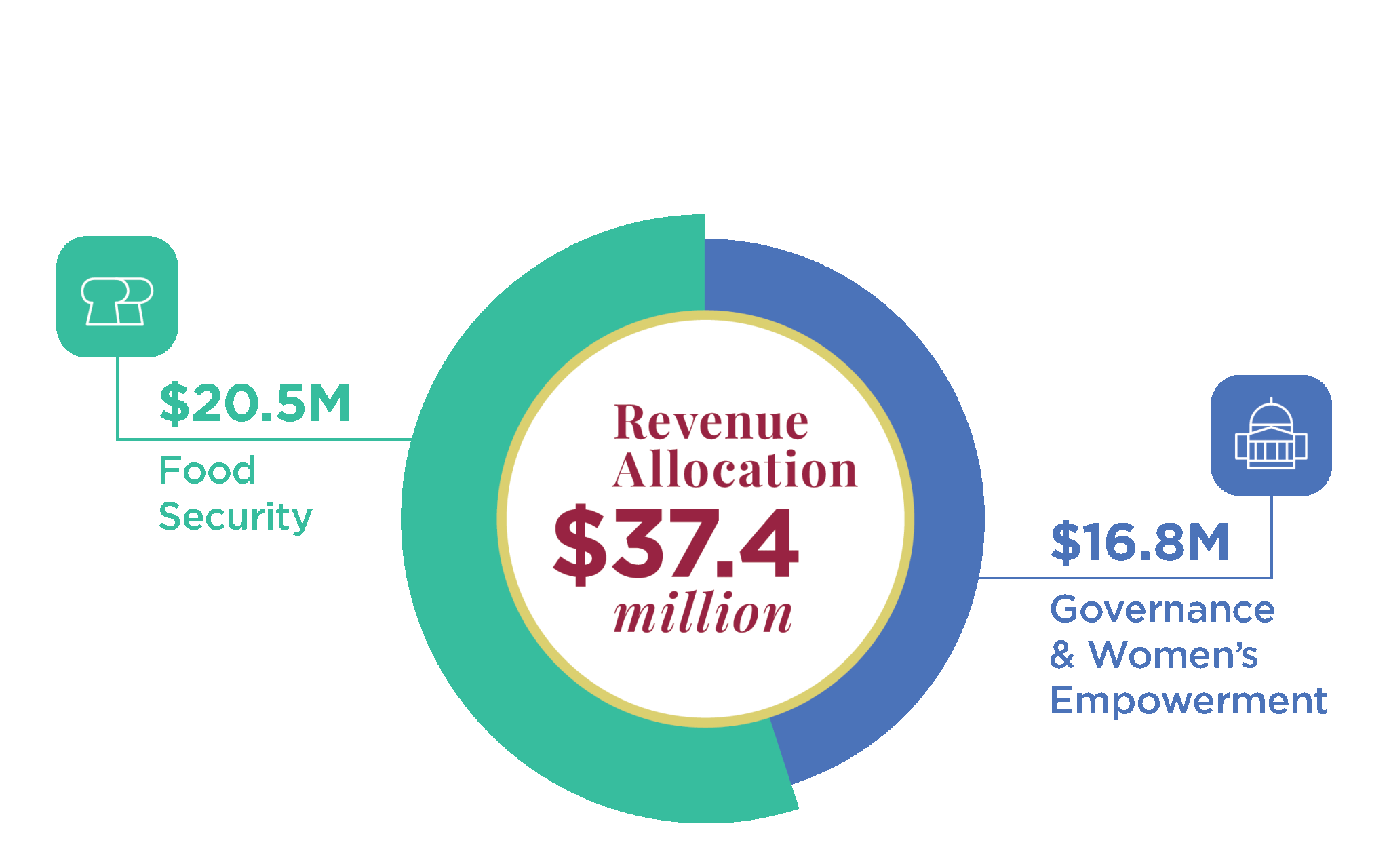
Funding by Program Area
Advancing Inclusion,
Investing in Women
Counterpart stands alongside communities shaping their own destinies. Helping people build better lives is a challenge we undertake every day with the support of our partners and donors. Join us in creating stronger, healthier, and more inclusive communities around the world.
DC OFFICE
1919 Pennsylvania Ave. NW, Suite 425
Washington, DC 20006
Contact
Phone: +1-571-447-5700
communications@counterpart.org
